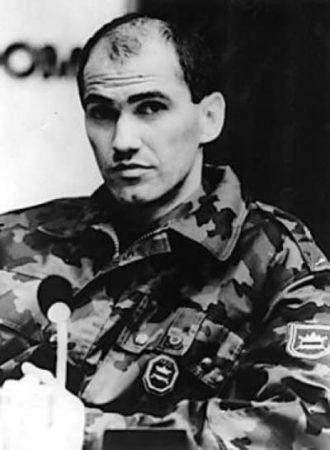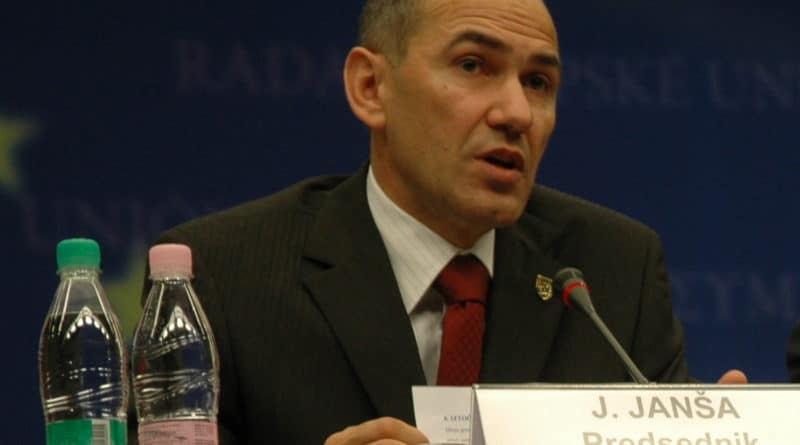Janša, first name Janez. An unsinkable at the head of the Slovenian presidency of the EU
(B2) The Slovenian Prime Minister will soon be at the forefront of the European Union for six months, starting on July 1. This is not his first attempt. He knows how to lead. And whoever can make it bend will have to do it several times

A 'red', anar
Janša was not a right-winger... at first. Rather, he was at the other end of the chessboard: to the left. Even very left. He is a Red, anar, anti-militarist, follower of Mao, in a country, Yugoslavia, dominated by a single party (the Communist League of Yugoslavia), which displays socialist, third-worldist self-management, and a certain distance with Moscow, but also knows how to pursue, in a severe way, the opponents of the line.
A passage through the Communist youth
Janez is one of those opponents. He is very critical. President of the Defense Committee of the Socialist Youth Association of Slovenia, he questions the management in the weekly Communist Youth Youth, renowned for his alternative spirit, and is expelled from the party. With his sidekick David Tasić (1), they put the authorities in turmoil. Tasić publishes 'The night of the long knives' which describes (using a recording) how the Central Committee of the Communist League planned to arrest the civil society activists. Other articles are published on the military plans of the Yugoslav army.
The JBTZ, launcher of Jansa's career
Following this case, they were arrested in 1988, along with a soldier Ivan Borštner, as well as the editor of Youth, Franci Zavrl. The four are court-martialled. Janša is sentenced to eighteen months in prison. Their trial, publicized, takes place in the middle of July 1988. A formidable mistake by the power of Belgrade! Those who were called the JBTZ group rose to fame. 'Free Janša' support committees spring up. They crystallize Slovenian resentment as never before, crystallizing salt for future independence. For Janša, it's the rocking, towards what will remain his passion: the political arena.
The founding of the opposition party
In 1989, when Slovenia broke the monopoly of the single party, Janša founded the SDZ, the Slovenian Democratic Union, the first opposition party and became its vice-president. In 1990-1991, during the emancipation phase of Slovenia, he held the key position of Minister of Defense of the very young Slovenian republic, still Yugoslav. It is up to him to forge the defense of the independent republic, from the territorial forces, poorly equipped and poorly trained, closer to the rural police than to the special forces. Parallel structures are put in place, in relation to the official command. Equipment is purchased.
We are at war
On June 27, 1991, when the Yugoslav army went on the offensive, two days after Ljubljana proclaimed its independence, the very young minister proclaimed on national television: “ We are at war ". Nobody wants to bet on the winner. However, with its anti-tank weapons, the very young army defeats the powerful Yugoslav People's Army. This left behind many tanks and several helicopters, and several hundred prisoners. It is from this victory that Janša propels himself to the fore. The European troika dispatched on the spot, urgently, obtains a compromise agreement.
The Moris Special Squad
The other side of the decor seems a little less glorious. In December 1990, a special brigade was set up, the Moris Brigade (Aka Ministry of Obrambo Republic of Slovenia), which foreshadows the Slovenian army. A military unit directly subordinate to the Minister of Defense (Janez Janša) and responsible for what could be called all special operations like 'under cover'. It was particularly active in 1991 when independence was gained. But also afterwards. She thus has loaned » weapons and ammunition to neighboring Croatian municipalities, to defend themselves against the Serbs. This then contravenes the embargo decreed at international level by the United Nations Security Council in September 1991 (2). The Yugoslav government in Belgrade, led mainly by the Serbs (after the departure of the Slovenes and the Croats) did the same before, supplying materials and equipment in large numbers to the Serbs in Croatia. The Moris brigade is also in charge of certain intelligence missions, listening to and spying on both politicians and journalists, and if necessary to put them aside.
Victories and defeats, a relentless power
Jansa will thus continue to evolve, over the years, between shadow and light, between success and opprobrium. He served as Minister of Defense until 1994, before being dismissed by then President Janez Drnovšek. The beating of one of his former collaborators in the middle of the street signals its end... But he will return. He returned to power, his party - now the SDS - having won the October 2004 elections, and became Prime Minister. A position he held until 2008, notably ensuring the first presidency of the European Union for Slovenia. The 2008 elections caused it to fall, by one seat. He must give way to his sworn enemies, the Social Democrats then led by Borut Pahor. He goes to the opposition, but returns to power thanks to a new coalition in 2012-2013.
The Patria Affair
In June 2013, he was hit in a dark case of corruption for the purchase of armored vehicles from the Finnish industrialist Patria. A case dating back to his previous term as Prime Minister (2004-2008). One of the biggest contracts that the Slovenian army (278 million euros) has ever concluded, which apparently includes a discreet appendix: the payment of cold and cold commissions to the SDS, the ruling party. He is sentenced to two years in prison. Conviction confirmed on appeal in April 2014. Janša then goes through the 'jail box' a second time! The delivery occurs in April 2015, with the annulment of the judgment unanimously by the Constitutional Court in April 2015. He is released after nine months in prison. The man will retain a certain bitterness, denouncing a " political conspiracy ».
A regular in the political game
Today, Janša is one of Slovenia's longest-lasting politicians, having lived through all the ages. With tenacity, he combines a resentment, often tenacious, always exacerbated. He kept a taste for verbal games, and others. Follower of twitter, in Trump fashion, he sends his banderillas in bursts. Moderation is not his forte. It does not go into tenderness. He pounded his opponents, not hesitating to bring out the heaviest artillery, and personal attacks below the belt (3). No matter the argument, the important thing is to type. To pacification, he prefers the battlefield, choosing his battleground, as his old diary recalls Youth.
(Nicolas Gros-Verheyde)
- Proclaimed best journalist in 1986, he left Youth in 1989 and in 1991 founded an independent publishing house 'Založba Karantaanija'.
- On the issue of the arms embargo on Yugoslavia, read this survey.
- His favorite target is public television. In March March 2016, he accused two journalists in a tweet of being " run down prostitutes at 30 and 35 euros ". What arouses investigation of the Council of Europe's Journalists Protection Platform. More recently, where he accuses them of being incapable and profiteering. New survey of the Council of Europe.

